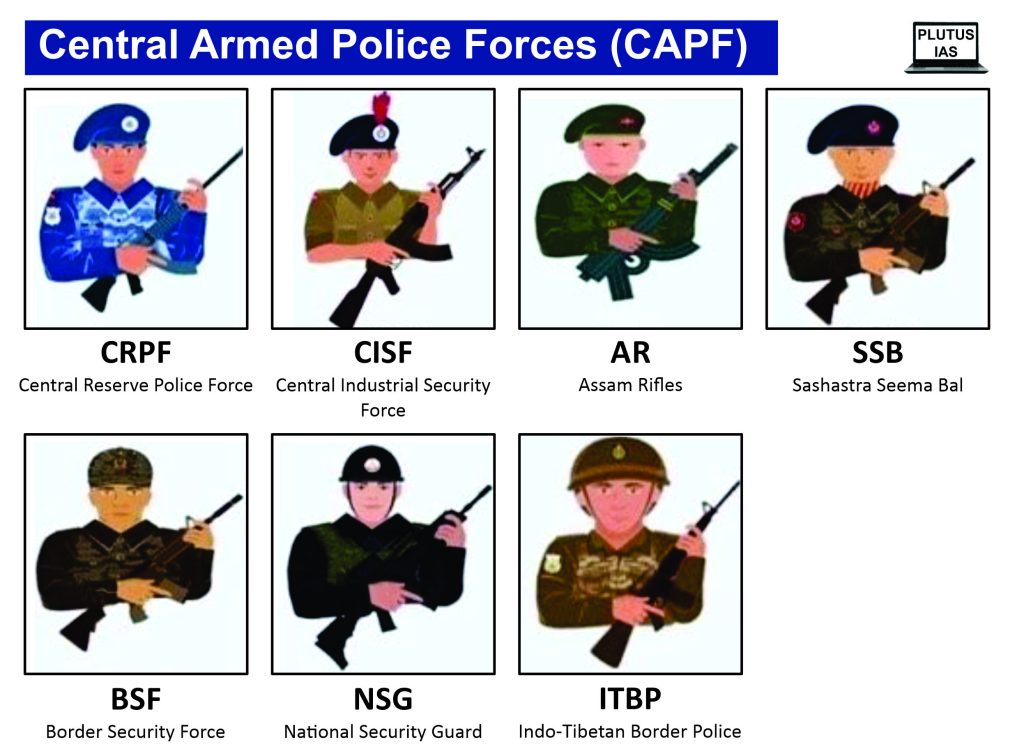31 Jan Expansion of the jurisdiction of BSF
This article covers ‘Daily Current Affairs’ and the topic details of “Expansion of the jurisdiction of BSF” .This topic is relevant in the “Internal Security” section of the UPSC CSE exam.
Why in the News?
The upcoming hearing in the Supreme Court focuses on the contentious expansion of the Border Security Force (BSF) jurisdiction in Punjab, following a 2021 notification by the Ministry of Home Affairs. The Punjab government has met this move with resistance, sparking a legal battle.
Understanding the Role of BSF: Safeguarding India’s Borders
- Established after the India-Pakistan war in 1965, the BSF is a pivotal component among the seven Central Armed Police Forces of India.
- Operating under the Ministry of Home Affairs, the 2.65-lakh strong force is strategically deployed along the borders with Pakistan and Bangladesh, involved in tasks ranging from guarding the Indo-Pakistan International Border to participating in Anti-Naxal Operations.
- Notably, the BSF also plays a significant role in UN peacekeeping missions.
Reasons Behind BSF Jurisdiction Extension
- The jurisdiction of the BSF, designed to secure India’s borders, empowers it to make arrests, conduct searches, and seize assets under various laws.
- Section 139(1) of the BSF Act grants the central government authority to designate areas near the borders for the BSF to prevent offenses under specified acts.
- The extension of jurisdiction, outlined in an October 2021 notification, expanded the BSF’s reach from 15 to 50 kilometers along the borders of Punjab, West Bengal, and Assam.
- This decision was prompted by the escalating use of drones and Unmanned Aerial Vehicles (UAVs) for activities such as spying and arms smuggling.
- Furthermore, they cited reasons for addressing cattle smuggling challenges and establishing a uniform 50-kilometer limit across states.
Challenges Raised by States and Federalism Concerns
- The extension of BSF’s jurisdiction has sparked concerns regarding the encroachment on state powers related to police and public order.
- States argue that this move interferes with their exclusive legislative authority, violating constitutional provisions.
- Some states perceive this as a departure from the principles of Federalism, challenging the distribution of powers between the central government and states.
- Geographical differences further complicate matters, with densely populated regions like Punjab facing a different impact compared to sparsely populated areas like Gujarat and Rajasthan.

Strategies for Effective Border Management
- To manage borders efficiently without compromising state jurisdiction, a collaborative approach between central and state law enforcement agencies is essential.
- Establishing frameworks for information sharing, coordination, and creating joint task forces with personnel from both central and state police are crucial steps. Involving state police in border surveillance, akin to successful models employed by the Coast Guard and Indian Navy, ensures mutual vigilance and comprehensive coverage.
- Investment in advanced surveillance technologies, including drones and sensors, is recommended for enhanced border monitoring. A clear legal framework outlining roles, responsibilities, and jurisdiction is imperative, along with protocols for addressing cross-border incidents through joint investigations when required.
- Regular consultations between central and state authorities and continuous dialogue platforms are essential to adapt strategies based on evolving security dynamics.
- Diplomatic initiatives for international cooperation with neighboring countries on border security matters, including joint initiatives, information sharing, and coordinated patrols, contribute to addressing transnational security challenges.
Constitutional Viewpoint on deployment
The central government has the authority to deploy forces to protect states from external aggression and internal disturbance, even if the state is hesitant to accept central forces. If a state opposes the deployment of Union forces, the Centre should issue directives under Article 355. If the state fails to adhere, the Centre may take further actions under Article 356 (President’s Rule).
Download plutus ias current affairs eng med 31st Jan 2024
Prelims practice question
Q1) Consider the following statements:
1) Ministry of Defense oversees the functioning of the BSF
2) Indian Coast Guard is not part of the Central Armed Police Forces
3) BSF is primarily responsible for guarding Coastal borders
Which of the statements given above is/are correct?
a) 1 only
b) 2 only
c) 2 and 3
d) 1 and 3
ANSWER: B
Mains practice questions
Q1) Examine the roles and responsibilities of the Border Security Force (BSF) in safeguarding India’s borders. Highlight its contributions and challenges in maintaining border security.
Q2) Examine the challenges posed by transnational crimes, such as smuggling and human trafficking, to India’s border security. Propose strategies and policies to address these challenges effectively.
I am a content developer and have done my Post Graduation in Political Science. I have given 2 UPSC mains, 1 IB ACIO interview and have cleared UGC NET JRF too.



No Comments